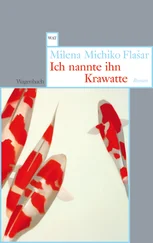Kumamoto stopped. Above him an advertisement for shampoo pulsed in neon letters. Men and women ran in wide arcs around us. We were an island in the middle of surging waves. An embrace, and suddenly Kumamoto held me tight. With both hands he gripped my arms. I’ve got it, he cried, there is no perfect poem! Its perfection arises precisely from its imperfection. Do you see? I did not want to see. He, into my ear: I have an image in my head. I see it clearly before me. Its colors are glaring and harsh in their brightness. But as soon as I rush to capture it, it explodes, and what I write down are separate bits that don’t form a whole. Do you see it now? It’s as if I tried to glue together a broken vase, piece by piece. But the shards are so fragmentary that I don’t know which goes with which or how I fit them together, there’s always one fragment left over. But this fragment! It makes the poem. It alone gives meaning. His voice was feverish: My requiem should be a vase with water shooting through the glue in its cracks.
He let go of me. I swayed. I felt the imprint of his fingers on my arms.
You’re sick, I whispered.
He replied: You are too.
It was a warning. I heard it and ignored it.
32
Days later, in physics class, Kumamoto passed me a note. It said: Tonight at eight. At the intersection. I want to put it right. I still have the note. I know exactly where in my room, which drawer it’s in. Under an ancient fossil with an insect trapped inside. Now and then I take it out and read, word for word, like a prayer: Tonight at eight. At the intersection. I want to put it right.
His illness.
I believe that was definitely his intention. He wanted and wanted and wanted. To put it right. He knew he could not honor what he owed his father, and he knew that his good spirits would not prevail forever. You can’t go on maintaining forever: I can’t do anything about it. At a certain age, which he didn’t want to reach, you must see that you can always do something about it. This was his illness: Too young he recognized that nothing is perfect, and he was too young to draw the right conclusions from it. Since this was my illness too, perhaps he wanted to warn me.
When I left the house that evening the air was damp and clammy. Like a wet cloth wrapped around your body. I was tense, ran, the asphalt soft under my feet. Already from a distance I spotted him. He had turned his face towards me. A searing look, at me. Raised his hand, called out. His mouth opened and closed again. I didn’t understand him. Eclipsed by the noise in the street, his call died away as he, without turning around, plunged like a swimmer into the traffic, headlong before my eyes. The outstretched hand. Squealing brakes. The hand still raised for seconds in the heavy air. Then it flopped down. Someone shouted: An accident! Panting, I reached the spot. Sharp elbows in my side. I burrowed through the rows of passersby. Kumamoto, covered in blood. His hand, white and thin. The howling of sirens. I stepped back. Blind. Blinded. Was pushed away, far away. Hey, you! You alright? I sank down onto the pavement. Beside me was a torn garbage bag. Rotting meat. I lost consciousness. When I came to again, they had already taken him away. Above me an advertisement for face masks. You alright? I stood up and walked.
33
I walked home, legs trembling. Each person I met had his eyes. Kumamoto everywhere. Thick bodies, bones inside, organs, nothing permanent. His death — Was he actually dead? — had given me x-ray vision. I remember the woman walking in front of me. She was beautiful. Delicately built. I looked at her back and watched, breathing in and out, her spine swinging to and fro as she walked. This spine, I understood all of a sudden, it is moving towards death. I remember the man who ran up to her, took her by the arm, kissed her hand. He too, ashes and dust. My parents. I remember. Mother, a skeleton, was sitting in front of the television. Father, a skeleton, was drinking frothy beer. Ah, there you are at last. Bare skulls eyed me from staring hollows. What’s to become of you, I heard. Running around late at night. Have you forgotten? Your future! Father bit into a piece of raw sausage. Tearing teeth. I rushed across the hall. My shadow after me, into my room. The door fell quietly shut.
34
Here, take a sip. You must drink something.
The tie, red and gray stripes, summoned me back to the park.
Take it slowly, he said, that’s better.
I was glad he didn’t say anything more than that.
What can you say, I continued. What can you say when you’ve run out of words? After the door shut behind me, I felt a speechless emptiness. I lay down, speechless, ran in my thoughts towards the intersection again. Kumamoto’s mouth. What had he shouted? Again and again I tried to read it from his lips, again and again I tried and failed. Was it a word? A word like freedom? Or life? Or happiness? Was it a no? Or a yes? A simple greeting? Perhaps: Farewell? Was it my name? Or: Father? Perhaps: Mother? Or something of no importance and it was pointless to want to know.
I spent the rest of the night in a trance. I didn’t sleep, yet I slept the sleep of a sleepwalker. As soon as I closed my eyes I saw the hand, in the dark chamber of my memory, Kumamoto’s hand, how it emerged, quite alone, rose from the black asphalt. It had pointed at me. At me of all the bystanders. And what upset me most about it was the sudden flush of shame, for this: I don’t know him. He doesn’t belong to me. I am happy to be pushed away. From him, who lies there, suffering. The shame had passed as quickly as it had come but it was no use pretending after the event that it was a natural reaction. It was there, I had felt it, it was always there, and with it the anger, so: Why had Kumamoto done something in public when it concerned only himself and himself alone? Why had he forced this cowardly shame on me? Never again, I swore, would I be dependent on someone else. Never again tangled in someone else’s fate. I wanted to enter a timeless room, where no one would ever startle me. Life would continue outside. I wanted to block it out, to hide away from it, not accept that it was happening to me. A fragment had penetrated my consciousness and made sense of Kumamoto’s requiem.
35
The next morning I stayed in bed. Nothing unusual. I’d often skipped school in the past. It had happened before that I’d stayed at home for three, four days, and because I made clever excuses, I’d been left in peace. The main thing was to bring home good grades. I made up for the lost hours thanks to my last reserves of zeal.
This time, however, it was different.
A week passed by. My parents were worried. A week later they were angry. A week later despairing. Despairing for a long time. Then angry again. Finally, worried. And so it went on, up and down, until I could no longer distinguish whether the weeks had turned into months, or the months into years. I had bolted the door to my room. Futile knocking, I did not answer. According to whether my parents were worried or angry or despairing, their knocking had a gray or white or black tone. It colored the silence, which absorbed me and resembled the silence of a dark forest. You walk along a winding path. Swaying treetops, the sun falling diagonally through the branches. In its beams shimmered spider webs, delicate designs of dreamy threads. You think: How quiet it is here. And recognize in the next moment that you are mistaken. The silence of the forest is an imbued silence. It is filled with the voices of the birds, the crackle of rotting wood. The beetles whirr. A tired leaf spins down. Like music the silence murmurs, like a song without beginning and end. This song is the origin of all other songs. In my room I realized: Silence has a body. It is alive. The dripping of the tap from the kitchen. Mother’s furry slippers. The ringing of the telephone. The fridge starts humming. Father’s slurping. Through the blocked-up keyhole I could hear what was outside breathing and was relieved not to have to mix my own breath with it. An itching on my scalp. I felt my hair growing.
Читать дальше












